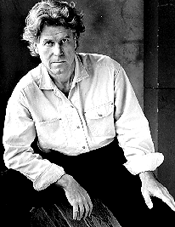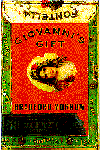|
Bradford Morrow |
 |
Everything comes back to ideas harnessed within sounds: utterance. Words are the oldest fossils. Primordial, primeval.
from an interview with Bradford Morrow |
|
Bradford Morrow worked as a jazz musician, translator, medical assistant, bookseller, and at various other jobs before founding the literary journal Conjunctions in 1981.† Born in Baltimore, Maryland, Morrow grew up in Colorado, and--after a decade of vagabonding from Honduras to France, Italy to England-- settled in New York City, where he has lived for the past two decades. The first of his five novels, Come Sunday (1988; recently republished) was followed by the publication of A Bestiary (1991), The Almanac Branch (which was a finalist for the 1992 PEN/ Faulkner Award), Trinity Fields (finalist for the 1995 Los Angeles Times Book Award), Giovanni's Gift, and most recently Arielís Crossing. Conjunctions, celebrating over 20 years of existence, has published the work of over 1000 innovative contemporary writers and artists, and was praised by novelist Robert Coover as "without exception, America's leading literary journal, one of the greatest such magazines in the literary history of the country." Morrow has taught at Princeton, Brown, and Columbia Universities, as well as the Naropa Institute, and is now Professor of Literature and Bard Center Fellow at Bard College. Morrow serves on the Board of Trustees of PEN American Center, where he chairs the PEN Forums Committee. He recently received the Academy Award in Literature from the American Academy of Arts and Letters. Viking has just published his new novel, Arielís Crossing, the
second volume of his New Mexico trilogy, the first of which was Trinity Fields,
reissued simultaneously in a new paperback edition from Penguin.† He is at work on a new novel, The
Prague Sonatas, and a collection of short fiction, Amazing Grace, whose
title story was shortlisted for this yearís O. Henry Prize and won a Pushcart
Prize.† For selected bibliography,
click here. |
Excerpts From Other Novels by Bradford
Morrow
Trinity Fields
The
Almanac Branch
Come
Sunday
Excerpts From Other Works by Bradford Morrow
The Emerson Madrigal
The
Night Watch
The
Journey to Trinity
Meditations
on a Shadow
The Art of Fiction
The
Channah Tales
Rivages
Roses for Neils Bohr
A Gift to Literature, the Beatrice Interview
"The
Jim Lewis interview with Bradford Morrow"
|
Bradford Morrow, from A Bestiary More Selections from Bradford Morrow's work:
|


